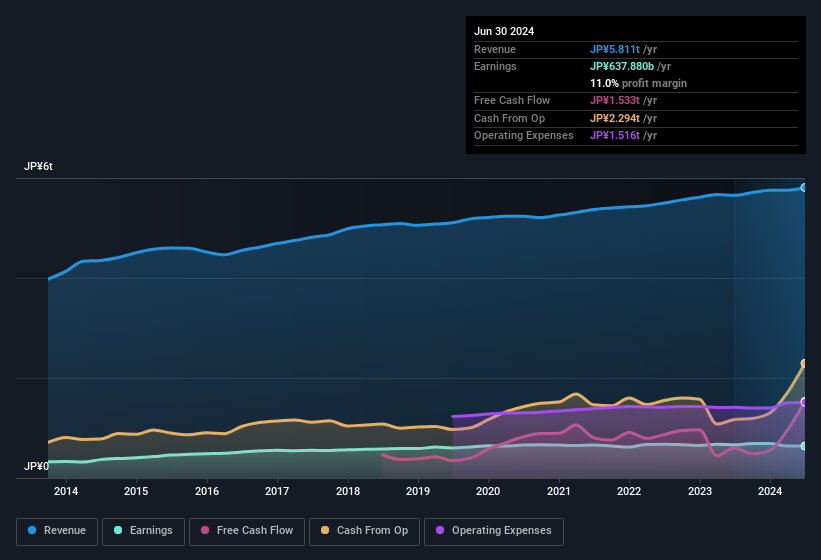- Japan
- /
- Wireless Telecom
- /
- TSE:9433
KDDI (TSE:9433) Is Posting Promising Earnings But The Good News Doesn’t Stop There

KDDI Corporation's (TSE:9433) solid earnings announcement recently didn't do much to the stock price. We did some digging, and we think that investors are missing some encouraging factors in the underlying numbers.
View our latest analysis for KDDI

Examining Cashflow Against KDDI's Earnings
In high finance, the key ratio used to measure how well a company converts reported profits into free cash flow (FCF) is the accrual ratio (from cashflow). In plain english, this ratio subtracts FCF from net profit, and divides that number by the company's average operating assets over that period. You could think of the accrual ratio from cashflow as the 'non-FCF profit ratio'.
As a result, a negative accrual ratio is a positive for the company, and a positive accrual ratio is a negative. While it's not a problem to have a positive accrual ratio, indicating a certain level of non-cash profits, a high accrual ratio is arguably a bad thing, because it indicates paper profits are not matched by cash flow. Notably, there is some academic evidence that suggests that a high accrual ratio is a bad sign for near-term profits, generally speaking.
Over the twelve months to June 2024, KDDI recorded an accrual ratio of -0.13. That implies it has good cash conversion, and implies that its free cash flow solidly exceeded its profit last year. Indeed, in the last twelve months it reported free cash flow of JP¥1.5t, well over the JP¥637.9b it reported in profit. KDDI shareholders are no doubt pleased that free cash flow improved over the last twelve months.
That might leave you wondering what analysts are forecasting in terms of future profitability. Luckily, you can click here to see an interactive graph depicting future profitability, based on their estimates.
Our Take On KDDI's Profit Performance
KDDI's accrual ratio is solid, and indicates strong free cash flow, as we discussed, above. Because of this, we think KDDI's earnings potential is at least as good as it seems, and maybe even better! And on top of that, its earnings per share have grown at 5.3% per year over the last three years. The goal of this article has been to assess how well we can rely on the statutory earnings to reflect the company's potential, but there is plenty more to consider. Keep in mind, when it comes to analysing a stock it's worth noting the risks involved. While conducting our analysis, we found that KDDI has 1 warning sign and it would be unwise to ignore this.
Today we've zoomed in on a single data point to better understand the nature of KDDI's profit. But there is always more to discover if you are capable of focussing your mind on minutiae. Some people consider a high return on equity to be a good sign of a quality business. So you may wish to see this free collection of companies boasting high return on equity, or this list of stocks with high insider ownership.
Valuation is complex, but we're here to simplify it.
Discover if KDDI might be undervalued or overvalued with our detailed analysis, featuring fair value estimates, potential risks, dividends, insider trades, and its financial condition.
Access Free AnalysisHave feedback on this article? Concerned about the content? Get in touch with us directly. Alternatively, email editorial-team (at) simplywallst.com.
This article by Simply Wall St is general in nature. We provide commentary based on historical data and analyst forecasts only using an unbiased methodology and our articles are not intended to be financial advice. It does not constitute a recommendation to buy or sell any stock, and does not take account of your objectives, or your financial situation. We aim to bring you long-term focused analysis driven by fundamental data. Note that our analysis may not factor in the latest price-sensitive company announcements or qualitative material. Simply Wall St has no position in any stocks mentioned.
About TSE:9433
KDDI
Engages in the provision of telecommunications services in Japan and internationally.
Undervalued with solid track record and pays a dividend.
Similar Companies
Market Insights
Community Narratives


